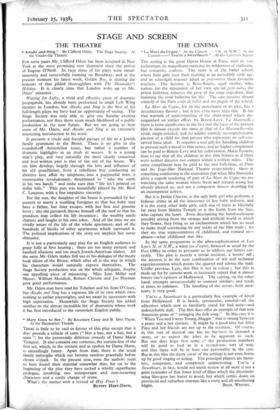THE CINEMA
"La Mort du Cygne." At the Curzon—" N. or NAY." At the Curzon—" You're a Sweetheart." At the Leicester Square THE setting is the great Opera House at Paris, with its vast auditorium, its magnificent staircase, its wilderness of chillsome, but romantic, coulisses. The story is of the ballet school, where little girls start their training at an incredibly early age, and in schoolgirl manner adopt as petit-mires their favourite teachers. The heroine is Rose-Souris, aged twelve, who, jealous for the reputation of her own special petit-mere, the prima ballerina, removes the prop of the stage trap-door, thus maiming the rival ballerina for life. The cast consists almost entirely of the Paris corps de ballet and the pupils of the school.
La Mort du Cygne, for all the melodrama of its plot, has a documentary flavour ; but it has even more than this. It has that warmth of understanding of the child-mind which dis- tinguished an earlier effort by Benoit-Levy, La Maternelle ; there is some significance in the fact that the basis of the present film is almost exactly the same as that of La Maternelle—the vivid, single-minded, and (to adults) entirely incomprehensible passion of a child for that person who represents its self-con- ceived beau ideal. It requires a real gift for handling children to present such a mood in film terms, and no higher compliment can be paid to Benoit-Levy and his collaborator, Marie Epstein, than to say that all the children in this film behave as if there were neither director nor camera within a million miles. The same compliment may be paid to the two ballerinas, of Paris and the Jugo-Slav National Theatre respectively ; there is something comforting in the realisation that when Mia Slavenska gives a superb rendering of part of La Mart du Cygne we are watching the same woman whose fresh and natural acting has already pleased us, and not a competent dancer doubling for an incompetent actress.
But it is Janine Charrat, as the ugly little girl who performs a hideous crime in all the innocence of her baby jealousy, and it is the many other little girls, each one of them as blissfully far away from Shirley Temple as is the Earth from the Sun, who capture the heart. Even discounting the bamboozlement possibly arising from the strange and artificial world in which they flower, they bring us an enchantment which has no need to make itself convincing by any tricks of the film trade ; for they are true representatives of childhood, and remind us- almost—what childhood was like.
In the same programme is the ultra-sophistication of Len Lye's N. or N.W., a witty jeu d'esprit, financed as usual by the Post Office in order to persuade us to address our letters cor- rectly. The plot is merely a trivial incident, a lovers' tiff ; the interest is in the neat combination of wit and technical experimentation which points the quarrel and adorns the mail. Unlike previous Lyes, this film is not in colour ; but this is made up for by camera-work so lusciously expert that it almost lowers one's opinion of Hollywood. The cutting, on the other hand, attempts unsuccessfully to contrast similars, and tends at times to jerkiness. The handling of the actors, both ama- teurs, is very good.
You're a Sweetheart is a particularly fine example of kitsch from Hollywood. It is lavish, spectacular, tuneful—all the adjectives which now so familiarly stand for bad taste—and indescribably dull. The film does offer an example of that new American game of " swinging the folk song." In this case it is " When You and I were Young, Maggie " that is swung between a piano and a hot clarinet. It might be a good idea but Alice Faye and her friends are not up to the occasion. Of course, in this sort of musical one has no business to demand a story, or to expect the jokes to be apparent as such. But one does hope that some cf the production numbers will be good to look at in a second-rate sort of way, and that there will be at least one personality in the cast. But in this film the dusty ennui of the settings is not even borne up by good singing or acting. The principal players are harm- less, competent, and completely uninteresting. You're a Sweetheart, in fact, would not merit review at all were it not a grim reminder of that lower level of films which the discrimin- ating film-goer has learnt to avoid, but which settles down on provincial and suburban cinemas like a sooty and all-smothering
















































 Previous page
Previous page